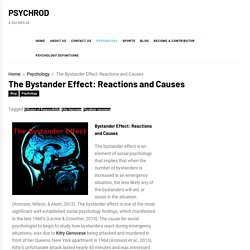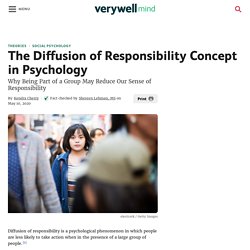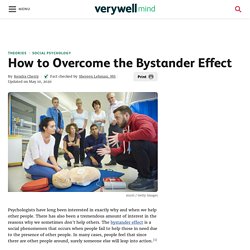

The Science of Empathy. Bystander Effect. Bystander Revolution: Dr. Philip Zimbardo. The Bystander Effect: Reactions and Causes - PSYCHROD. Bystander Effect: Reactions and Causes The bystander effect is an element of social psychology that implies that when the number of bystanders is increased in an emergency situation, the less likely any of the bystanders will aid, or assist in the situation (Aronson, Wilson, & Akert, 2013).

The bystander effect is one of the most significant well established social psychology findings, which manifested in the late 1960’s (Levine & Crowther, 2013). The cause for social psychologist to begin to study how bystanders react during emergency situations, was due to Kitty Genovese being attacked and murdered in front of her Queens, New York apartment in 1964 (Aronson et al., 2013). Kitty’s unfortunate attack lasted nearly 45 minutes and was witnessed by nearly 38 residents who did not assist by calling police, or trying to stop her attacker (Aronson et al., 2013).
Cultural Differences of Helping Behavior and The Bystander Effect References Aronson, E., Wilson, T., &Akert,R. (2013). Chinese Toddler Yueyue's Death Sparks Outrage. The Bystander Effect:The Death of Kitty Genovese. Bystander Intervention in Emergencies: Diffusion of Responsibility. How Diffusion of Responsibility Affects People. Diffusion of responsibility is a psychological phenomenon in which people are less likely to take action when in the presence of a large group of people.1 For example, imagine that you are in a large city on a bustling street.

You notice a man fall to the ground and start convulsing as if having a seizure. Many people turn and look at the man, but no one moves to help or call for medical assistance. Why? Because there are so many people present, no one person feels pressured to respond. This situation is often used to explain the bystander effect, which suggests that the greater the number of people present, the less likely people are to help a person in distress. Darley and Latané on Diffusion of Responsibility In a series of classic experiments conducted in the late 1960s, researchers John Darley and Bibb Latané asked participants to fill out questionnaires in a room which suddenly began to fill with smoke.2.
Understanding Pluralistic Ignorance in Social Psychology. 4 Major Implications of Bystander Effect on the Society. BYSTANDER INTERVENTION. Overcoming the Bystander Effect. Have you ever been a hero? Going about our daily routines, few of us have the opportunity to save a life or disrupt a crime in progress—fewer still take that opportunity when it presents itself. I once witnessed a car accident in which the guilty party leapt from his disabled vehicle and fled the scene.
I quickly pulled over and dialed 911. Fortunately, another passerby stopped and apprehended the suspect. The culprit—who was clearly intoxicated—struggled to escape, but he was easily overpowered. Not only are acts of heroism unsurprisingly rare, reports about observers who, out of indifference or perplexity, fail to report criminal behavior or respond to emergencies with inaction are common. Psychologists Bibb Latané and John Darley identified a pattern of behavior they called the bystander effect, which they demonstrated in their labs for the first time in 1968. How to Overcome the Bystander Effect. Psychologists have long been interested in exactly why and when we help other people.

There has also been a tremendous amount of interest in the reasons why we sometimes don't help others. The bystander effect is a social phenomenon that occurs when people fail to help those in need due to the presence of other people. In many cases, people feel that since there are other people around, surely someone else will leap into action.1 While the bystander effect can have a negative impact on prosocial behavior, altruism and heroism, researchers have identified a number of different factors that can help people overcome this tendency and increase the likelihood that they will engage in helping behaviors.2 Some of these include: Witnessing Helping Behavior Sometimes just seeing other people doing something kind or helpful makes us more willing to help others.